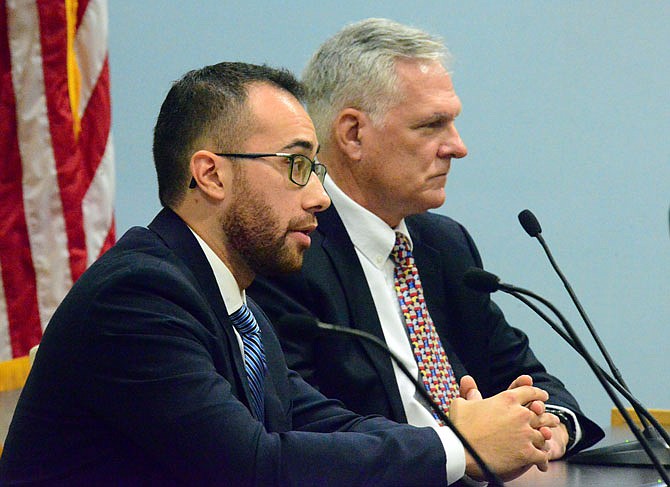Who has more and better prosecutorial experience was one of the main issues the two Republican candidates for Cole County prosecuting attorney debated at a News Tribune-hosted forum Tuesday night, but each candidate's vision of prosecutorial discretion in various capacities and circumstances was also a core issue.
Incumbent county prosecuting attorney Mark Richardson has held the position for 12 years. Locke Thompson is challenging him in the Republican primary.
The winner of the Aug. 7 Republican primary will face presumed Democratic nominee Deirdre Hirner in the November general election.
Richardson began his law career in 1984 at the Missouri Attorney General's Office, was an assistant Cole County prosecutor from 1985-92, was in private practice for more than a decade and has been a municipal judge.
Thompson worked as an assistant prosecutor in Jasper County before returning to his home community of Jefferson City to work in the special prosecutions unit of the Missouri Attorney General's Office. While in that role, he specialized in criminal prosecutions, crimes of public corruption and violent sexual predator cases. He left that position to campaign full-time for Cole County prosecuting attorney.
Richardson said past county prosecutors have often come into the position with more jury trial experience - 20 or 30 trials, including murder cases. The exact amount of jury trial experience was a matter of contention - Richardson said he served as lead counsel 120 times versus two or three as lead counsel out of a total of eight jury trials for Locke.
"I think the best folks to ask about my experience or my youth would probably be some of the folks I've put away," Thompson said to address voters' concerns about his level of experience, before he listed names of people he described including former public officials and violent sexual predators.
"At the end of the day, each jury trial I've worked on, each case I've worked, I try to take something and learn something from it and take it on to the next case," he added, describing more experience isn't necessarily the same as better experience.
"Just because of the gravity of the criminal case, it shouldn't affect your office's ability to prosecute that efficiently while you continue to prosecute the rest of the local caseload," he said of having to sometimes juggle high-profile cases with statewide implications, given that Cole County is the state capital.
"If someone's a state official, has committed a crime that goes to the heart of their duties, (and) it's a crime that occurred in Cole County, then that should be prosecuted," Richardson said of the county office's role in the capital, adding the local prosecutor should focus on serious threats to public safety and not "petty political fights on the state level."
Richardson said there was no probable cause to file a charge against former Gov. Eric Greitens. "That decision was the correct decision," he added of not filing against Greitens - something Thompson and others have suggested was a decision influenced by partisan politics.
"Sometimes, the prosecutor is in a bad position in the sense that if someone brings an allegation that doesn't have a basis to it, the mere announcement of that allegation is going to be unfair, and I try to treat all people the same way whether they're a City Council person or a governor," Richardson said.
"A good line is when it goes into criminal conduct and affects other people," he responded to a question about how to determine when to prosecute acts of civil disobedience - if such acts put other people in danger, such as protesters shutting down a highway, or if such acts disrespect the system of permitted protests, such as shutting down a government function by trespassing after being given a lawful order to leave, as he referred to a case in 2014 when 23 clergy members protested in the Senate in favor of Medicaid expansion.
"If someone by the letter of the law has broken the law, then ethically, as a prosecutor you need to file that charge. Where you go with it from there or how you prioritize it, that's all subject to prosecutorial discretion," Thompson said of his standard of when to prosecute civil disobedience.
The majority of felony cases a county prosecutor will face, though, are felony drug cases.
Cole County had 712 felony criminal cases in 2017, according to records from the Office of State Courts Administrator. OSCA records also show 455 of those were felony drug cases.
Thompson said he would like to establish a mental health court to help deal with the problem, because he said 80 percent of drug addicts have underlying mental health issues they may be self-medicating. He favored having drug courts like the county currently has but added also implementing a mental health court will give offenders who meet criteria "the opportunity to go through a system that really addresses, in depth, both issues."
Richardson said the county's veterans, DWI and drug courts operate well, but he wants a more thorough screening process to prevent career criminals who threaten the public from taking advantage of those courts.
He added it's the county prosecutor's role to work in conjunction with law enforcement on tackling the supply side of illegal drug use.
Thompson said, though, "there's also a lot that prosecutors can do to affect the demand for those drugs," such as steering qualified offenders to alternative judicial venues such as drug, mental health and veterans courts, "so that in the long run, they're not going back to that drug use. If you just throw people in prison without treating them for drug addiction or a mental health issue, they're three times more likely to come back out and re-engage in that activity."
Nine people - of 79 felony DWI cases - were accepted into the Cole County DWI Court, and 15 people - of 455 felony drug cases - graduated from the Cole County Drug Court in 2017, according to OSCA.

